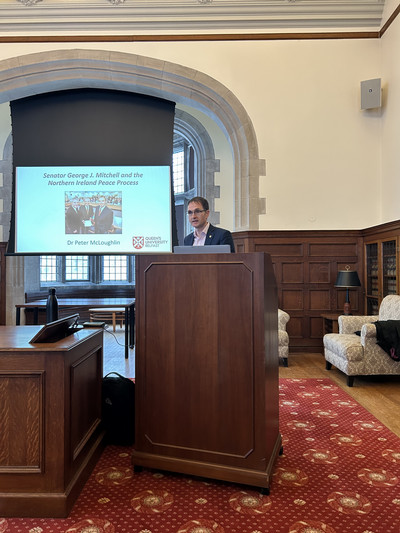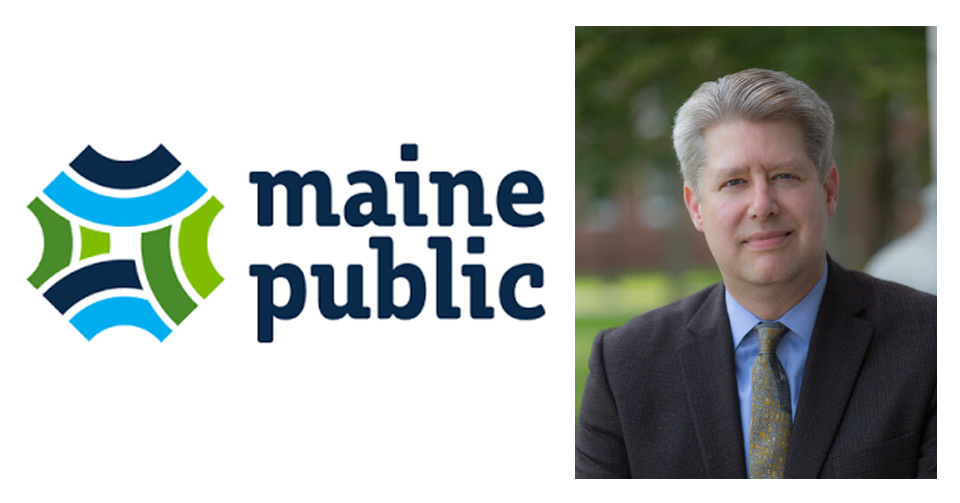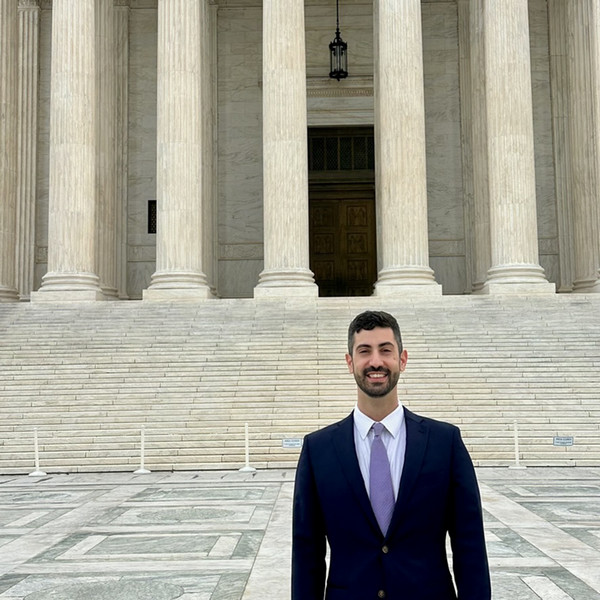Angus King’s Thoughts on Government and Taxes
Angus King, a distinguished lecturer at the College since 2004, is a regular contributor to the Bowdoin Daily Sun. In his latest post, the former two-term governor of Maine takes on the notion that government and taxes are always the problem.

“The ideas of economists and political philosophers, both when they are right and when they are wrong, are more powerful than is commonly understood. Indeed the world is ruled by little else. Practical men, who believe themselves to be quite exempt from any intellectual influence, are usually the slaves of some defunct economist.” —John Maynard Keynes
I’ve come to realize that the most influential defunct political philosopher of our times is Ronald Reagan. Genial and supremely likeable (he was the uncle we all wished we’d had), Reagan did some real good, like helping to drive the Soviet economy off the cliff and hastening the end of the Cold War. But he also unleashed two notions that are still reverberating today, have become fundamental pillars of the Conventional Wisdom, and are dividing the country to the point of undermining our ability to govern ourselves. The first is “Government isn’t the solution, it’s the problem.” Like all generalizations, this one is wrong.
Sometimes government is the problem—when nonsensical regulations constrain worthwhile activity, when taxes reach confiscatory levels, or when government officials are corrupt or just plain incompetent. But when your house is burning down, you don’t think the (government) fire department is the problem, or when a (government) police officer or judge puts away the bad guy who robbed your store, or when you drive on the (government) highway to work. And we certainly didn’t think the Army, Navy, Marines, and Army Air Corps were the problem when we and the rest of Western Civilization were on the brink of defeat in World War II. The point is that government is not by a long shot always the problem—and in many cases (admittedly, not in all) it is the only possible solution.
In fact, the two biggest disasters of the last few years—the financial meltdown and the Gulf oil gusher (as Bill Maher noted, calling this thing a “spill” is like calling World War II at “tiff”)—can both be attributed to not enough government. There’s not much doubt that the banking collapse was a direct result of insufficient regulatory oversight and the repeal of the Glass-Steagall Act, the depression-era law which prohibited commercial banks from also being risk-takers in investments like derivatives (a bi-partisan mistake in the late nineties). Likewise, it’s clear in hindsight that lax regulation of offshore drilling led directly to the disaster in the Gulf.
Note that the government in no way caused these disasters—they were unadulterated products of the free market—but insufficient government certainly allowed them to happen.
The fact is that in a complex globalized economy, dominated by huge corporations often with no national (or any other) allegiances, government is the only real protector we have, imperfect as it may be. When you go into a fast-food restaurant, it’s impossible for you to learn the provenance of the beef in your burger. To protect yourself from indigestion or worse, you need a whole chain of government, from regulation of the feed to the slaughtering of the cow to the transportation of the beef to the cleanliness of the kitchen. The free market purists (who seem to go by the name of Libertarians these days) would argue that if you get sick, you can always sue the bastards (in the, ahem, government-sponsored court system) or just eat someplace else. Cold comfort if you’re dead.
We know what the unfettered free-market looks like, by the way, because we gave it a full-blown try at the turn of the 20th Century. It looks like 15 year-old girls in textile mills ten hours a day, six days a week (right here in Brunswick); thousands of men dying in their forties from black lung disease in West Virginia; kids leaving school after the eighth grade to go to work (like all four of my grandparents); and a life of poverty if you were unlucky enough to get injured on the job.
So when someone tells you they want to go back to the good old days when government didn’t meddle in the free market, ask them to be specific about when exactly those days were and who they want to be. I’ll guarantee it’s not one of those girls in the mill.
The second notion that sprung from the Reagan era—which now seems to be the official core ideology of the Republican Party—is that taxes are always bad, always too high, and are always wasted by whatever level of government is collecting them. A formative experience for me in this regard occurred a couple of years ago at a Christmas party in a small town up (down?) the coast. I was talking to a nice lady who turned out to be a selectperson, and asked her what the hottest issue in town was these days. “Oh, property taxes, by far,” she replied immediately. So I followed-up, “What’s your mil rate?” “Nine mils,” was her indignant reply. Huh? In Brunswick, Portland, or Lewiston, people would kill for 9 mils (it’s more like 25 mils in those places—almost triple the level she was exercised about).
I tell this story not to justify the rate in Brunswick but only to make the point that whatever the local level is, it’s perceived as too high. Maybe this is good because it leads to a healthy concentration on controlling taxes, regardless of the rate, but it easily slides over into an all-taxes-are-bad-and-too-high-no-matter-what attitude which leads in turn to an inability for government to deliver the services people need and expect.
Which brings me to another story. I was riding the Harley up north and stopped into a local gas station/convenience store to fuel-up. The lady behind the counter saw me crossing the lot and when I came in the door, greeted me with what can only be characterized as a bark: “Ha! The Tax Man.” Let’s just say she wasn’t all that happy to see me. In spite of the greeting, I paid for the gas without comment and turned to leave. And here’s the punch line: she then barked after me, “Where’re you going from here?” “Down the road to the south,” I replied. “Good,” she answered, “I hope you have a bumpy ride; maybe you’ll fix the road!”
It was the lack of any sense of irony that got me. She sure didn’t like the taxes, but she just as adamantly wanted the road fixed. (Many states are trying to resolve this dilemma by simply tricking people out of their money rather than telling them that if they want the services, they have to pay for them. It’s euphemistically called “gaming,” but the more accurate word is gambling, and, as we all know, the House—and their new partners, the government—always wins).
The point is that taxes aren’t bad, per se. They can be too high and can discourage enterprise, to be sure, and we can certainly argue about what’s an essential expenditure, but some level of taxes are necessary to build the roads, equip the Army, and inspect the beef. And interestingly, in this year of the Tea Party and anti-tax mania, overall taxes (state, local, and federal) in the U.S. (are you sitting down?)are at the lowest level in 60 years. (That rascal Obama, lowering our taxes as part of the dreaded Stimulus Package; must be socialism in some kind of disguise). Hard to know what to make of this.
My father—the best man I ever met—never complained about taxes. He had two principles: that paying income taxes was good because it meant that you were making money and, more fundamentally, that paying taxes was a privilege of citizenship. Can you imagine such a quaint idea?
But I’ve come to think my Dad was closer to the truth than Reagan. Unfortunately, Dad only had me to listen to him while Reagan had the whole country.



